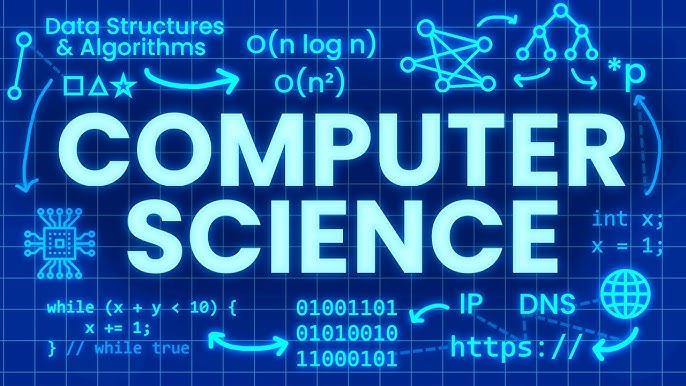Exploring the World of Computer Science: A Path to Innovation and Future Careers
Computer science is the study of computational systems, programming, and the theory behind the design of computer hardware and software. It is a rapidly evolving field that plays a pivotal role in shaping the modern world, touching almost every aspect of our lives—from healthcare and education to business and entertainment. As technology continues to advance at an unprecedented pace, the demand for skilled computer scientists has grown significantly, making computer science one of the most sought-after disciplines for students and professionals alike.
This article explores the key areas of computer science, its impact on society, and why pursuing a career in this field is a promising path for the future.
What is Computer Science?
At its core, computer science involves the study of algorithms, data structures, and the principles of computing. It encompasses a wide range of topics, including programming, artificial intelligence (AI), machine learning, cybersecurity, data analysis, and software development. The discipline is not just about coding; it is about understanding how to solve problems, optimize processes, and create innovative solutions using technology.
Key areas within computer science include:
- Programming Languages: The foundation of computer science is programming, where professionals write instructions for computers to execute. Languages such as Python, Java, C++, and JavaScript are commonly used to create software, websites, applications, and more.
- Algorithms and Data Structures: This area focuses on developing efficient algorithms to process data. Data structures such as arrays, linked lists, trees, and graphs are used to store, organize, and manipulate data, enabling computer systems to solve complex problems quickly.
- Artificial Intelligence and Machine Learning: AI and machine learning are transforming industries by enabling computers to “learn” from data, recognize patterns, and make decisions without human intervention. These technologies power everything from self-driving cars to recommendation systems and personalized healthcare.
- Cybersecurity: As digital systems become more interconnected, the need to protect data and networks from cyber threats has become crucial. Cybersecurity involves safeguarding sensitive information, preventing hacking, and ensuring the integrity of systems.
- Data Science and Big Data: With the explosion of digital information, data science has emerged as a critical field for analyzing and extracting insights from large datasets. Tools like Python and R are commonly used to process, analyze, and visualize data in meaningful ways.
- Software Development: This area involves the design and creation of software applications, including web, mobile, and desktop programs. Developers work on everything from user interfaces and backend systems to cloud computing and mobile applications.
- Human-Computer Interaction (HCI): HCI focuses on improving the interaction between humans and computers by designing user-friendly interfaces and systems that are intuitive and accessible to users.
The Impact of Computer Science on Society
Computer science has revolutionized the way we live and work. Its impact is evident in various sectors:
- Healthcare: From diagnostic tools to robotic surgeries, computer science has improved healthcare delivery and patient outcomes. AI is being used to predict disease outbreaks, analyze medical images, and provide personalized treatment plans.
- Education: Online learning platforms, virtual classrooms, and educational apps have made learning more accessible and interactive. Students can now access vast amounts of information and resources from anywhere in the world.
- Business: E-commerce platforms, digital marketing tools, and automation technologies have transformed the business landscape. Companies use data analytics to make informed decisions, improve customer experiences, and optimize operations.
- Entertainment: The gaming industry, virtual reality (VR), and streaming services like Netflix rely heavily on computer science. AI is used to enhance gaming experiences, while algorithms personalize content recommendations for users.
- Transportation: Autonomous vehicles, GPS systems, and traffic management solutions are examples of how computer science is reshaping transportation, making it more efficient and safe.
- Communication: Social media platforms, messaging apps, and video conferencing tools have changed how we communicate, bringing people closer regardless of geographical distances.
Why Pursue a Career in Computer Science?
- High Demand for Professionals: The digital age has created an insatiable demand for computer science professionals. According to the U.S. Bureau of Labor Statistics, computer and information technology occupations are expected to grow much faster than the average for all occupations, with job opportunities in fields like software development, data science, cybersecurity, and AI.
- Lucrative Salaries: Careers in computer science are some of the highest-paying jobs in the tech industry. Software developers, data scientists, AI engineers, and cybersecurity experts can expect competitive salaries and strong job security.
- Diverse Career Opportunities: Computer science is not limited to just tech companies. Professionals in this field can work in a wide range of industries, including finance, healthcare, education, government, and entertainment. Whether you’re interested in designing video games, building AI systems, or protecting sensitive information from hackers, computer science offers a variety of career paths.
- Constant Innovation: The field of computer science is dynamic and constantly evolving. New technologies such as quantum computing, blockchain, and AI continue to emerge, offering opportunities for professionals to innovate and push the boundaries of what’s possible.
- Global Relevance: As the world becomes more digital, computer science skills are relevant across borders. Professionals with expertise in programming, data analysis, and cybersecurity are in demand worldwide, making it a global career choice.
- Problem-Solving and Creativity: At its core, computer science is about solving problems. Whether you’re developing a new app, optimizing an algorithm, or designing a secure system, computer science encourages creativity and critical thinking.
How to Succeed in Computer Science
- Develop Strong Programming Skills: Mastering programming languages like Python, Java, C++, and others is crucial. Practice coding regularly to build your skills and familiarity with different tools and technologies.
- Stay Updated: The field of computer science evolves rapidly, so staying updated with the latest technologies and trends is important. Participate in online courses, attend workshops, and engage with the tech community to keep learning.
- Work on Projects: Apply what you’ve learned by working on real-world projects. Contributing to open-source projects, building your own applications, or completing internships can help you gain practical experience.
- Learn Soft Skills: While technical skills are essential, soft skills such as communication, teamwork, and problem-solving are equally important. Being able to collaborate with others and explain complex concepts to non-technical stakeholders is crucial for success.
- Explore Specializations: Computer science is a vast field with many specializations, including AI, machine learning, cybersecurity, and more. Explore different areas and find your niche based on your interests and career goals.
Conclusion
Computer science is a dynamic and exciting field that offers endless possibilities for innovation, problem-solving, and career growth. As technology continues to shape the future, computer scientists will be at the forefront of developing new solutions that address global challenges. Whether you’re interested in AI, software development, or data science, pursuing a career in computer science can lead to fulfilling opportunities that impact the world in meaningful ways.
For more articles on technology, education, and career insights, visit ITSparkMedia.


